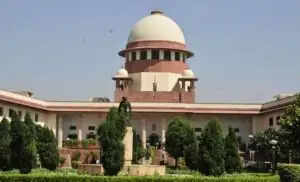Supreme Court's Stance on Waqf Properties Sparks Controversy: What’s Next?
Supreme Court Addresses Waqf Properties

New Delhi: On Wednesday, the Supreme Court suggested that properties recognized as waqf, including those classified as 'waqf by user', should not be de-notified. However, the Centre opposed this recommendation and requested a hearing before any such decision is made.
The court also inquired whether Muslims could participate in Hindu religious trusts.
The bench stated, "Properties recognized by courts as waqfs should remain classified as such, regardless of whether they are waqf-by-user or waqf by deed, while we review the challenge to the Waqf Amendment Act 2025."
The Chief Justice Sanjiv Khanna, along with Justices Sanjay Kumar and K V Viswanathan, initially considered referring the case to a high court but later opted for an extensive hearing with senior advocates, including Kapil Sibal and Abhishek Singhvi, representing the petitioners, and Tushar Mehta for the Centre.
While the bench has not yet issued a formal notice, it plans to continue hearings on the petitions on April 17 at 2 PM.
The court expressed concern regarding the violence that erupted following the law's enactment, describing it as troubling.
The Chief Justice proposed that ex-officio members could be appointed irrespective of their faith, but other members must be Muslims.
The bench questioned Mehta on the feasibility of disallowing 'waqf by user', noting that many individuals lack the necessary documentation to register such waqfs.
'Waqf by user' pertains to properties recognized as religious or charitable endowments based on their long-term use for such purposes, even without a formal declaration by the owner.
The bench remarked, "How will you register such waqfs by user? What documentation will they possess? This could lead to significant issues. While some misuse exists, there are also legitimate cases. I have reviewed judgments from the privy council that recognize waqf by user. Undoing it would create complications. The legislature cannot declare a judgment or decree void; it can only take it into account."
Mehta countered that a significant number of Muslims do not wish to be governed by the Waqf Act.
The bench then pressed Mehta, asking, "Are you suggesting that Muslims will now be allowed to join Hindu endowment boards? Please clarify openly."
The court emphasized that a public trust declared as a waqf centuries ago cannot suddenly be reclassified by the waqf board.
'You cannot rewrite history,' the bench stated.
Mehta noted that a joint parliamentary committee had conducted 38 sessions and reviewed 98.2 lakh memorandums before the Act was passed by both houses of Parliament.
At the hearing's outset, the Chief Justice indicated, "We want both sides to address two points: whether we should handle this or refer it to the high court, and briefly outline your arguments. We are not implying any restriction on the Supreme Court's ability to hear and decide on challenges to the law."
Sibal, representing the petitioners, challenged the provision of the Waqf Amendment Act that restricts waqf creation to Muslims.
'How can the state determine my Muslim identity and eligibility to create waqf?' Sibal questioned.
He further argued, 'How can the government stipulate that only those practicing Islam for the last five years can establish waqf?'
Senior advocate Abhishek Singhvi, representing some petitioners, asserted that the Waqf Act would have nationwide implications and should not be referred to the high court.
Senior advocate Huzefa Ahmadi, opposing the Waqf Act, stated that waqf by user is an established Islamic practice that cannot be abolished.
The Centre recently enacted the Waqf (Amendment) Act, 2025, which received President Droupadi Murmu's assent on April 5 after contentious debates in Parliament.
The bill passed in the Rajya Sabha with 128 votes in favor and 95 against, while the Lok Sabha approved it with 288 supporting and 232 opposing.
Approximately 72 petitions, including those from AIMIM leader Asaduddin Owaisi, the All India Muslim Personal Law Board (AIMPLB), Jamiat Ulama-i-Hind, the Dravida Munnetra Kazhagam (DMK), and Congress MPs Imran Pratapgarhi and Mohammad Jawed, have been filed challenging the Act's validity.
On April 8, the Centre filed a caveat in the Supreme Court, seeking a hearing before any orders are issued regarding the matter.
A caveat is a legal notice filed to ensure that no orders are made without the party's presence.
